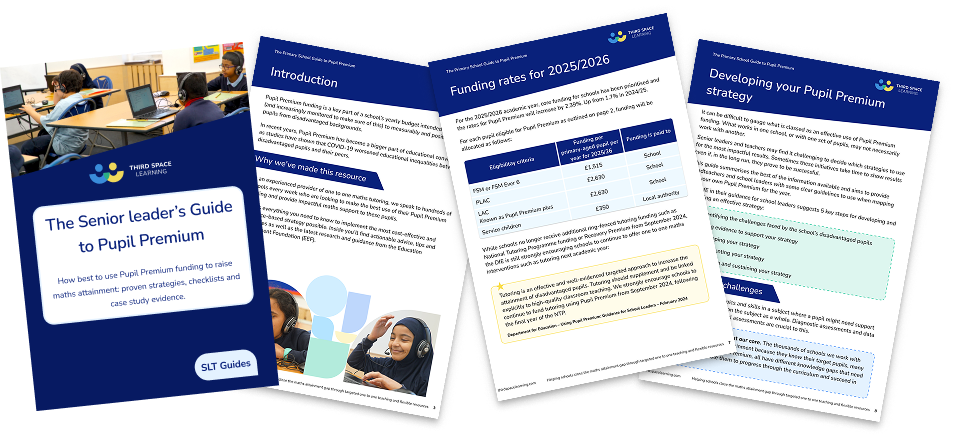A Guide To Pupil Premium Funding With Allocations For 2025-26
Pupil premium funding for the 2025 / 2026 academic year shows a slight increase on previous years, but school budgets stretched more than ever.
Here we look at the pupil premium funding from 2016 to 2026, including year-on-year changes (if any), to help you spot any potential trends.
Even slight changes in funding for eligible pupils in receipt of the pupil premium grant can have a considerable impact overall for your school.
It’s a good idea to keep an eye on both the overall funding rate as well as your school’s funding pupil premium allocation.
What is pupil premium funding?
Pupil premium funding was first introduced in 2011 by the Department for Education to help schools close the attainment gap between children from different socio-economic backgrounds.
Additional funding for each school depends on several factors:
- whether the school is primary or secondary
- which category the pupil falls under
- how many pupils are eligible for pupil premium funding
See below for the pupil premium funding amounts for this year.
The Senior Leader’s Guide to Pupil Premium
Download informative and concise guides on the interventions that will have the biggest impact for the children in your care.
Download Free Now!Who is eligible for pupil premium funding?
Eligibility for pupil premium is not a given right for every child in England. Conditions of grant for pupil premium funding are defined as:
- Primary or secondary pupils who are currently eligible for free school meals (FSM) or have been eligible for FSM at any point in the last 6 years
- Looked after children – pupils who at any time have been looked after by the local authority or other state carers
- Pupils previously looked after by the local authority or other state care
- Service pupil premium is available for anyone whose parent(s) have served in the armed forces or have been a full time forces reserve in the last 6 years or have died during service
Early years pupil premium is also available to help improve their educational provisions for children aged 3-4 years old.
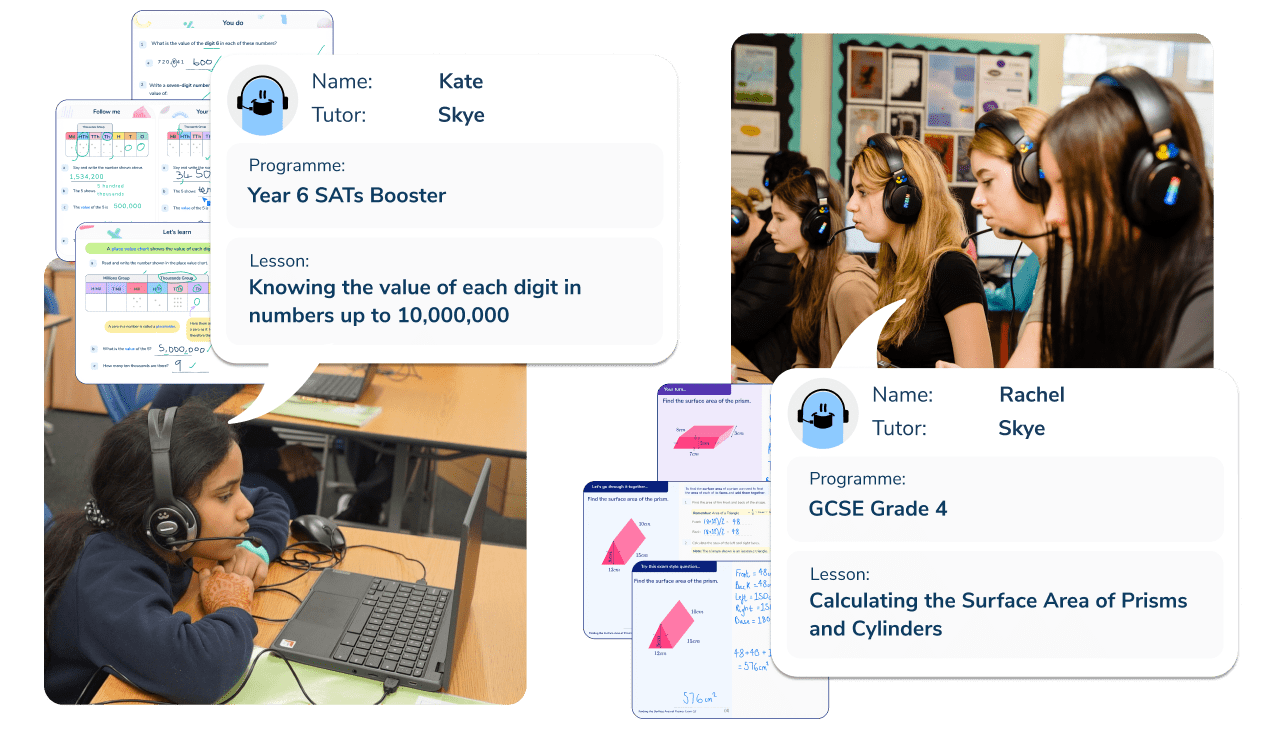
Meet Skye, the voice-based AI tutor making maths success possible for every student.
Built by teachers and maths experts, Skye uses the same pedagogy, curriculum and lesson structure as our traditional tutoring.
But, with more flexibility and a lower cost, schools can scale online maths tutoring to support every student who needs it.
Watch Skye in actionPupil Premium Funding Allocations 2016- 2025
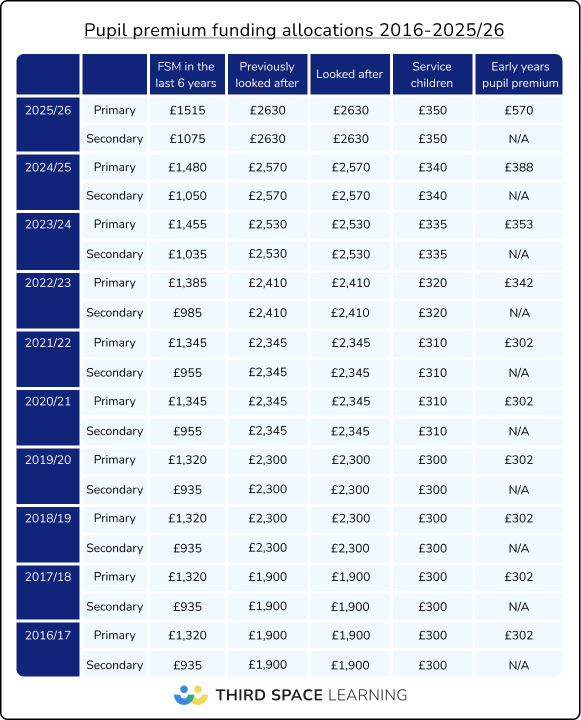
What is recovery premium?
Recovery premium and pupil premium are closely linked. After Covid-19, the government introduced recovery premium funding to support disadvantaged pupils and further close the attainment gap.
However, the recovery premium was discontinued from the 2024/25 financial year.
Pupil premium funding 2025/2026
For the 2025/2026 academic year, the rates for Pupil Premium will increase by between 2.39%.
- Primary pupils who are eligible for Free School Meals, or have been eligible in the past 6 years: £1,515
- Secondary pupils who are eligible for Free School Meals, or have been eligible in the past 6 years: £1,075
- Looked after pupils currently or previously in local authority or other state care: £2,630
Pupil premium funding 2024/2025
For the 2024/2025 academic year, the rates for Pupil Premium will increase by between 1.4 and 1.7%. This is below the rate of inflation which is around 3.9%.
- Primary pupils who are eligible for Free School Meals, or have been eligible in the past 6 years: £1,480
- Secondary pupils who are eligible for Free School Meals, or have been eligible in the past 6 years: £1,050
- Looked after pupils currently or previously in local authority or other state care: £2,570
Pupil premium funding 2023/2024
For the 2023/2024 academic year, the rates for all types of Pupil Premium increased by 5% on the previous year.
- Primary pupils who are eligible for Free School Meals, or have been eligible in the past 6 years: £1,455
- Secondary pupils who are eligible for Free School Meals, or have been eligible in the past 6 years: £1,035
- Looked after pupils currently or previously in local authority or other state care £2,530
Pupil premium funding 2022/2023
For the 2022/2023 academic year, the rates for all types of Pupil Premium increased by 2.7% on the previous year:
- Early Years Pupil Premium (EYPP) for pupils who meet the eligibility criteria (LAC, previously LAC or whose parents meet the criteria for Free School Meals): £342.
- Pupils in Primary School (Reception to Year 6) recorded as Ever 6 FSM (qualified to receive free school meals presently or any time over the previous six years): £1,385.
- Pupils in Secondary School (Years 7 to 11) recorded as Ever 6 FSM: £985.
- Looked after children (LAC) and previously LAC (adopted from care, or under a special guardianship order, a child arrangements order or a residence order): £2,410.
- Service children (pupils from Reception to Year 11 recorded as an Ever 6 service child or in receipt of a child pension from the Ministry of Defence): £320.
Pupil premium funding 2021/2022
For the 2021/2022 academic year, the rates for all types of Pupil Premium remained unchanged from the previous year:
- Early Years Pupil Premium (EYPP) for pupils who meet the eligibility criteria (LAC, previously LAC or whose parents meet the criteria for Free School Meals): £302.
- Pupils in Primary School (Reception to Year 6) recorded as Ever 6 FSM (qualified to receive free school meals presently or any time over the previous six years): £1,345.
- Pupils in Secondary School (Years 7 to 11) recorded as Ever 6 FSM: £955.
- Looked after children (LAC) and previously LAC (adopted from care, or under a special guardianship order, a child arrangements order or a residence order): £2,345.
- Service children (pupils from Reception to Year 11 recorded as an Ever 6 service child or in receipt of a child pension from the Ministry of Defence): £310.
Pupil premium funding 2020/21
For the 2020/2021 academic year, the rates for Pupil Premium increased by £25 for children recorded as FSM, £45 for previously looked after and looked after children and £10 for armed forces service children. Early years pupil premium remained unchanged:
- Early Years Pupil Premium (EYPP) for pupils who meet the eligibility criteria (LAC, previously LAC or whose parents meet the criteria for Free School Meals): £302.
- Pupils in Primary School (Reception to Year 6) recorded as Ever 6 FSM (qualified to receive free school meals presently or any time over the previous six years): £1,345.
- Pupils in Secondary School (Years 7 to 11) recorded as Ever 6 FSM: £955.
- Looked after children (LAC) and previously LAC (adopted from care, or under a special guardianship order, a child arrangements order or a residence order): £2,345.
- Service children (pupils from Reception to Year 11 recorded as an Ever 6 service child or in receipt of a child pension from the Ministry of Defence): £310.
Pupil premium funding 2019/20
For the 2019/2020 academic year, the rates for all types of Pupil Premium remained unchanged from 2018:
- Early Years Pupil Premium (EYPP) for pupils who meet the eligibility criteria (LAC, previously LAC or whose parents meet the criteria for Free School Meals): £302.
- Pupils in Primary School (Reception to Year 6) recorded as Ever 6 FSM (qualified to receive free school meals presently or any time over the previous six years): £1,320.
- Pupils in Secondary School (Years 7 to 11) recorded as Ever 6 FSM: £935.
- Looked after children (LAC) and previously LAC (adopted from care, or under a special guardianship order, a child arrangements order or a residence order): £2,300.
- Service children (pupils from Reception to Year 11 recorded as an Ever 6 service child or in receipt of a child pension from the Ministry of Defence): £300.
Pupil premium funding 2018/2019
For the 2018/2019 academic year, the rates for most Pupil Premium funding remained unchanged, but increased by £400 per pupil for Pupil Premium Plus. Rates for the 2018/2019 year were:
- Early Years Pupil Premium (EYPP) for pupils who meet the eligibility criteria (LAC, previously LAC or whose parents meet the criteria for Free School Meals): £302.
- Pupils in Primary School (Reception to Year 6) recorded as Ever 6 FSM (qualified to receive free school meals presently or any time over the previous six years): £1,320.
- Pupils in Secondary School (Years 7 to 11) recorded as Ever 6 FSM: £935.
- Looked after children (LAC) and previously LAC (adopted from care, or under a special guardianship order, a child arrangements order or a residence order): £2,300.
- Service children (pupils from Reception to Year 11 recorded as an Ever 6 service child or in receipt of a child pension from the Ministry of Defence): £300.
Pupil premium funding 2017/2018
For the 2017/2018 academic year, the various rates of additional funding were unchanged from the previous year and set at the following rates:
- Early Years Pupil Premium (EYPP) for eligible pupils (LAC, previously LAC or whose parents meet the criteria for Free School Meals): £302.
- Pupils in Primary School (Reception to Year 6) recorded as Ever 6 FSM (qualified to receive free school meals presently or any time over the previous six years): £1,320.
- Pupils in Secondary School (Years 7 to 11) recorded as Ever 6 FSM: £935.
- Looked after children (LAC) and previously LAC (adopted from care, or under a special guardianship order, a child arrangements order or a residence order): £1,900.
- Service children (pupils from Reception to Year 11 recorded as an Ever 6 service child or in receipt of a child pension from the Ministry of Defence): £300.
Pupil premium funding 2016/2017
For the 2016/2017 academic year, the various rates of additional funding were set by the Department for Education at the following rates:
- Early Years Pupil Premium (EYPP) for eligible pupils (Looked after children (LAC), previously LAC or whose parents meet the criteria for Free School Meals): £302.
- Pupils in Primary School (Reception to Year 6) recorded as Ever 6 FSM (qualified to receive free school meals presently or any time over the previous six years): £1,320.
- Pupils in Secondary School (Years 7 to 11) recorded as Ever 6 FSM: £935.
- LAC and previously LAC (adopted from Local Authority Care, or under a special guardianship order, a child arrangements order or a residence order): £1,900.
- Service children (pupils from Reception to Year 11 recorded as an Ever 6 child of a member of the armed forces, or in receipt of a child pension from the Ministry of Defence): £300.
What can pupil premium be spent on?
Every state-funded school and mainstream school as well as academies must evidence their pupil premium strategy statement so official bodies, such as Ofsted, can see how pupil premium funding is contributing to education outcomes for eligible children.
A pupil premium strategy template can be accessed via the DfE on the gov.uk website along with examples for both primary and secondary schools.
Additionally, the Education Endowment Foundation (EEF) provide an extensive Teaching and Learning Toolkit evidencing the most successful pupil premium strategies and where to start.
Pupil premium funding must be spent on strategies that are intended to close the attainment gap. These can include a range of initiatives, from direct academic support to broader, systemic improvements in quality first teaching and learning environments.
A child’s school may use pupil premium funding to ensure good quality first teaching. While all children may benefit from this, many believe this is what will have the greatest impact on closing the attainment gap.
However, for those eligible children who require more support, the DfE states that schools can use pupil premium funding on targeted learning interventions to close the attainment gap. These 10 low-cost pupil premium intervention ideas are a good place to start.
Using pupil premium funding to fund one to one tutoring
While metacognition and feedback can boost progress, evidence suggests that one to one tuition is one of the most effective ways to accelerate children’s learning and close the attainment gap — particularly for those eligible for pupil premium funding.
Since 2013, Third Space Learning has been providing online one to one maths tuition to the pupils who need it most.
Over the past decade, more than 50% of Third Space Learners have been eligible for pupil premium funding.
Each pupil receives personalised weekly one-to-one lessons. Every session starts with a diagnostic skill check in to identify pupils’ specific needs. Based on pupils’ answers, Skye adapts its teaching to suit the individual. Those who demonstrate sufficient understanding jump ahead to independent practice and challenge questions. For those who struggle, Skye walks them through the lesson step by step. Each session is followed by a skill check out question to assess pupils’ understanding of the lesson. Teachers receive weekly reports to track the intervention’s impact.
Each lesson has been carefully sequenced, designed and aligned to the national curriculum by a team of primary and secondary maths experts.
Multiple pupils attend one-to-one sessions simultaneously with maths specialist AI tutor Skye, who tailors lessons to each individual, helping to close the maths attainment gap — without adding to staff workload.
Third Space Learning is the most affordable one to one tutoring provider. One to one maths sessions with AI tutor Skye are 90% cheaper than other tutoring providers.
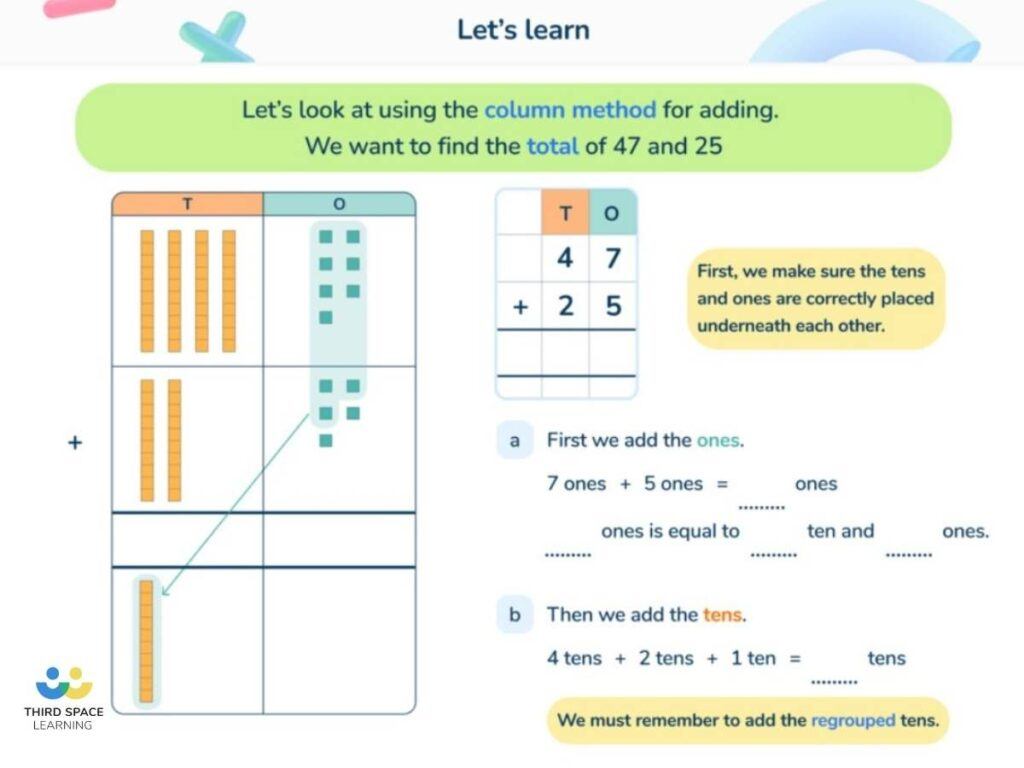
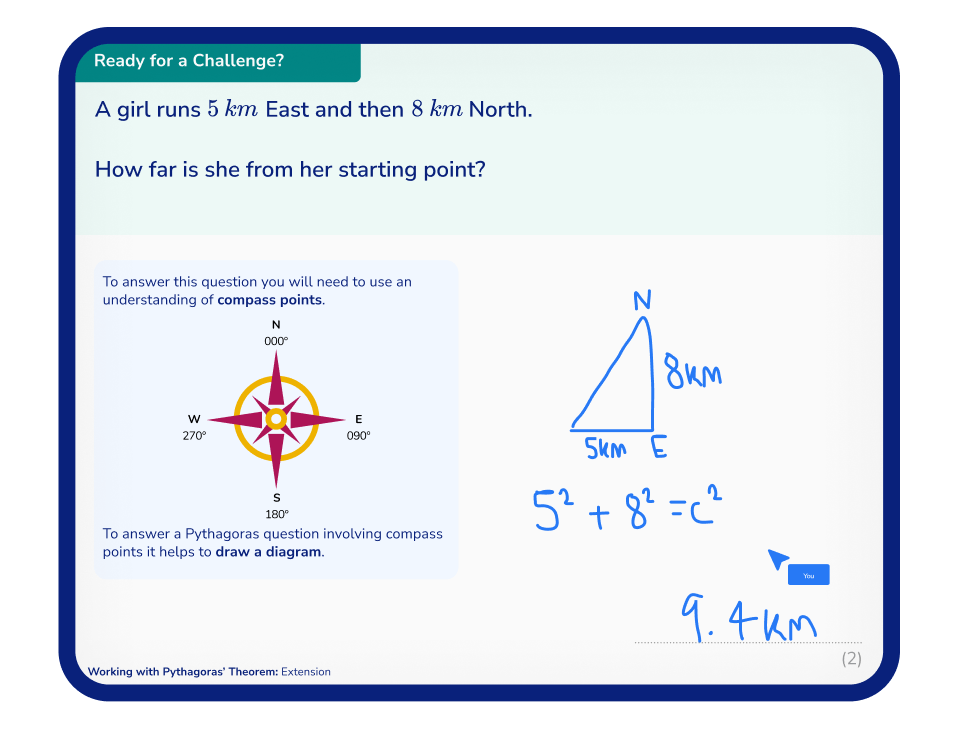
Read more:
DO YOU HAVE STUDENTS WHO NEED MORE SUPPORT IN MATHS?
Skye – our AI maths tutor built by teachers – gives students personalised one-to-one lessons that address learning gaps and build confidence.
Since 2013 we’ve taught over 2 million hours of maths lessons to more than 170,000 students to help them become fluent, able mathematicians.
Explore our AI maths tutoring or find out about one to one tuition for your school.



